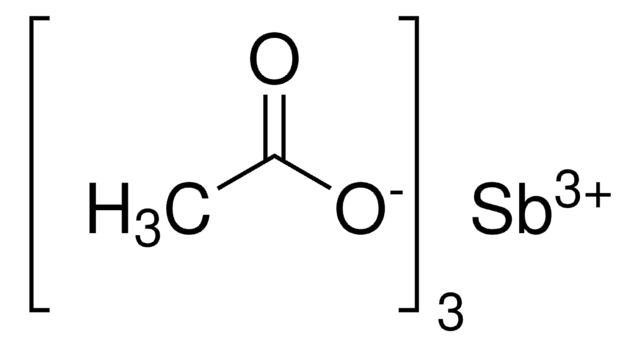452343
Antimony
beads, ≤5 mm, low oxide, 99.999% trace metals basis
Synonym(s):
Antimony black, Antimony element, Stibium
Sign Into View Organizational & Contract Pricing
All Photos(1)
About This Item
Empirical Formula (Hill Notation):
Sb
CAS Number:
Molecular Weight:
121.76
EC Number:
MDL number:
UNSPSC Code:
12141704
PubChem Substance ID:
NACRES:
NA.23
Recommended Products
Quality Level
Assay
99.999% trace metals basis
form
beads
resistance
41.7 μΩ-cm
particle size
≤5 mm
bp
1635 °C (lit.)
mp
630 °C (lit.)
density
6.69 g/mL at 25 °C (lit.)
SMILES string
[Sb]
InChI
1S/Sb
InChI key
WATWJIUSRGPENY-UHFFFAOYSA-N
Looking for similar products? Visit Product Comparison Guide
Application
Applied in the solid state synthesis of a Zintl phase, SrSn3Sb4, with an anionic channel framework of 30-membered rings.
accessory
Product No.
Description
Pricing
Storage Class Code
11 - Combustible Solids
WGK
WGK 3
Flash Point(F)
Not applicable
Flash Point(C)
Not applicable
Choose from one of the most recent versions:
Certificates of Analysis (COA)
Lot/Batch Number
Don't see the Right Version?
If you require a particular version, you can look up a specific certificate by the Lot or Batch number.
Already Own This Product?
Find documentation for the products that you have recently purchased in the Document Library.
Customers Also Viewed
Budhaditya Mukherjee et al.
Proceedings of the National Academy of Sciences of the United States of America, 110(7), E575-E582 (2013-01-24)
The molecular mechanism of antimony-resistant Leishmania donovani (Sb(R)LD)-driven up-regulation of IL-10 and multidrug-resistant protein 1 (MDR1) in infected macrophages (Ms) has been investigated. This study showed that both promastigote and amastigote forms of Sb(R)LD, but not the antimony-sensitive form of
Daoyong Zhang et al.
Bioresource technology, 128, 711-715 (2012-12-19)
Extracellular polymeric substances (EPS) existed ubiquitously in biological systems affect the mobility and availability of heavy metals in the environments. The adsorption-desorption behaviors of Hg(II) and Sb(V) on EPS were investigated. The sorption rates follow Sb(V) > Hg(II), and the
Jian Chen et al.
Chemosphere, 90(6), 1925-1932 (2012-11-15)
Coal is one of the major energy resources in China, with nearly half of produced Chinese coal used for power and heat generation. The large use of coal for power and heat generation in China may result in significant atmospheric
Joseph N Jarvis et al.
Current opinion in infectious diseases, 26(1), 1-9 (2012-12-12)
HIV infection profoundly impairs the immune mechanisms needed to control and clear Leishmania infection, and outcomes in patients with HIV-associated visceral leishmaniasis are poor. This review summarizes recent work describing the epidemiology, presentation and outcomes of HIV-associated visceral leishmaniasis and
Jaime Soto et al.
Clinical infectious diseases : an official publication of the Infectious Diseases Society of America, 56(9), 1255-1260 (2013-02-08)
Cutaneous leishmaniasis is an ultimately self-curing disease for which systemic therapy with pentavalent antimony (Sb) is effective but with side effects. We evaluated 2 local treatments, intralesional (IL) Sb and cryotherapy, for single lesions due to Bolivian Leishmania (v.) braziliensis
Our team of scientists has experience in all areas of research including Life Science, Material Science, Chemical Synthesis, Chromatography, Analytical and many others.
Contact Technical Service









